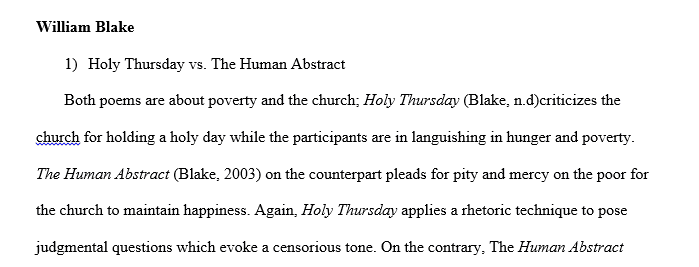Counterpart poems from Songs of Innocence and of Experience
William Blake:
Discuss Blake’s two “Holy Thursday” poems or any other pair of counterpart poems from Songs of Innocence and of Experience. What different views of the same person, place, situation, and so on are offered in your two poems? What conclusions does each poem seem to reach about, and through, the subject it depicts? How do the poems’ formal qualities–syntax, diction, rhythm, rhyme, and so on-contribute to their distinctive tone and theme(s)?
Drawing on evidence from various poems in the “Songs of Experience” section of Songs of Innocence and of Experience, discuss how, “London” (954) or “The Sick Rose” (1008) works as a “Song of Experience” poem. What similarities do you see between “London” or “The Sick Rose” and other “Experience” poems? What does either of these poems add to the “Experience” sequence?
Kevin Young:
What do “Rue,” “Charity,” and “Wintering” say Young’s perspective on grief?
How does ”Expecting, “ a poem about new life, compare and relate to Young’s grief poems—“Rue,” “Charity,” and “Wintering”?
Unlike the other poems in this album about his son, “Greening” refers to Young’s son after he has been born. In what other ways does this poem differ from “Expecting,” “Quickening,” and “Breaking Water”?
Solution preview for the order on counterpart poems from Songs of Innocence and of Experience
APA
229 words
